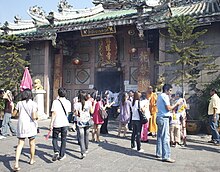Chinese-Thai

Visitors at Wat Mangkon Kamalawat, one of the most prominent Chinese Buddhist temples in Thailand
|
|
| Total population | |
|---|---|
|
(9,349,900 (est) Thais of at least partly Chinese descent (around 40 percent of the Thai population) (2012)) |
|
| Regions with significant populations | |
| Thailand | |
| Languages | |
|
Thai Varieties of Chinese (Teochew, Hakka, Hainanese, Foochow, Cantonese, Hokkien, and Southwestern Mandarin) |
|
| Religion | |
| Predominantly Theravada Buddhism minorities Mahayana Buddhism, Chinese folk religion, Christianity and Sunni Islam |
|
| Related ethnic groups | |
|
Thai people • Southern Chinese • Peranakan Overseas Chinese |
| Thai Chinese | |||||||||||
| Traditional Chinese | |||||||||||
|---|---|---|---|---|---|---|---|---|---|---|---|
| Simplified Chinese | |||||||||||
|
|||||||||||
| Alternative Chinese name | |||||||||||
| Traditional Chinese | |||||||||||
| Simplified Chinese | |||||||||||
|
|||||||||||
| Transcriptions | |
|---|---|
| Standard Mandarin | |
| Hanyu Pinyin | Tàiguó Huáqiáo |
| Yue: Cantonese | |
| Yale Romanization | Taaigwok Wàkìu |
| Transcriptions | |
|---|---|
| Standard Mandarin | |
| Hanyu Pinyin | Tàiguó Huárén |
| Yue: Cantonese | |
| Yale Romanization | Taaigwok Wàyàn |
(9,349,900 (est)
14 percent of the Thai population (2012)
Thai Chinese consist of Thai people of full or partial Chinese ancestry – particularly Han Chinese. Thailand is home to the largest overseas Chinese community in the world with a population of approximately nine million people, accounting for 14 percent of the Thai population as of 2012. It is also the oldest, most prominent, and best integrated overseas Chinese community. Slightly more than half of the ethnic Chinese population in Thailand trace their ancestry to eastern Guangdong Province. This is evidenced by the prevalence of the Minnan Chaozhou dialect among the Chinese in Thailand. A minority trace their ancestry to Hakka and Hainanese immigrants.
The Thai Chinese have been deeply ingrained into all elements of Thai society over the past 200 years. The present Thai royal family, the Chakri Dynasty, was founded by King Rama I who himself was partly Chinese. His predecessor, King Taksin of the Thonburi Dynasty, was the son of a Chinese immigrant from Guangdong Province and a Thai mother. With the highly successful integration of historic Chinese immigrant communities throughout Thailand, a significant number of Thai Chinese are the descendants of intermarriages between Chinese immigrants and native Thais. Many Thai Chinese have assimilated into Thai society and self-identify solely as Thai.
In modern times, Thai Chinese exist at all levels of Thai society and have a strong presence in Thailand's business sector and politics with most of Thailand's former prime ministers and the majority of parliament having at least some Chinese ancestry.
Thailand has the largest overseas Chinese community in the world. Fourteen percent of Thailand's population is considered ethnic Chinese. One Thai academic of Chinese origin claims the share of those having at least partly Chinese ancestry is estimated at about 40 percent, but without an accurate census or nationwide DNA testing, there is no credible evidence to support this theory.
For assimilated second- and third-generation Thai Chinese and even some first-generation immigrants, it has remained principally a personal choice whether or not a Thai person of Chinese descent chooses to identify himself as ethnic Chinese. Nonetheless, nearly all Thai Chinese self-identify as Thai, due to their close integration and successful assimilation into Thai society.
...
Wikipedia
